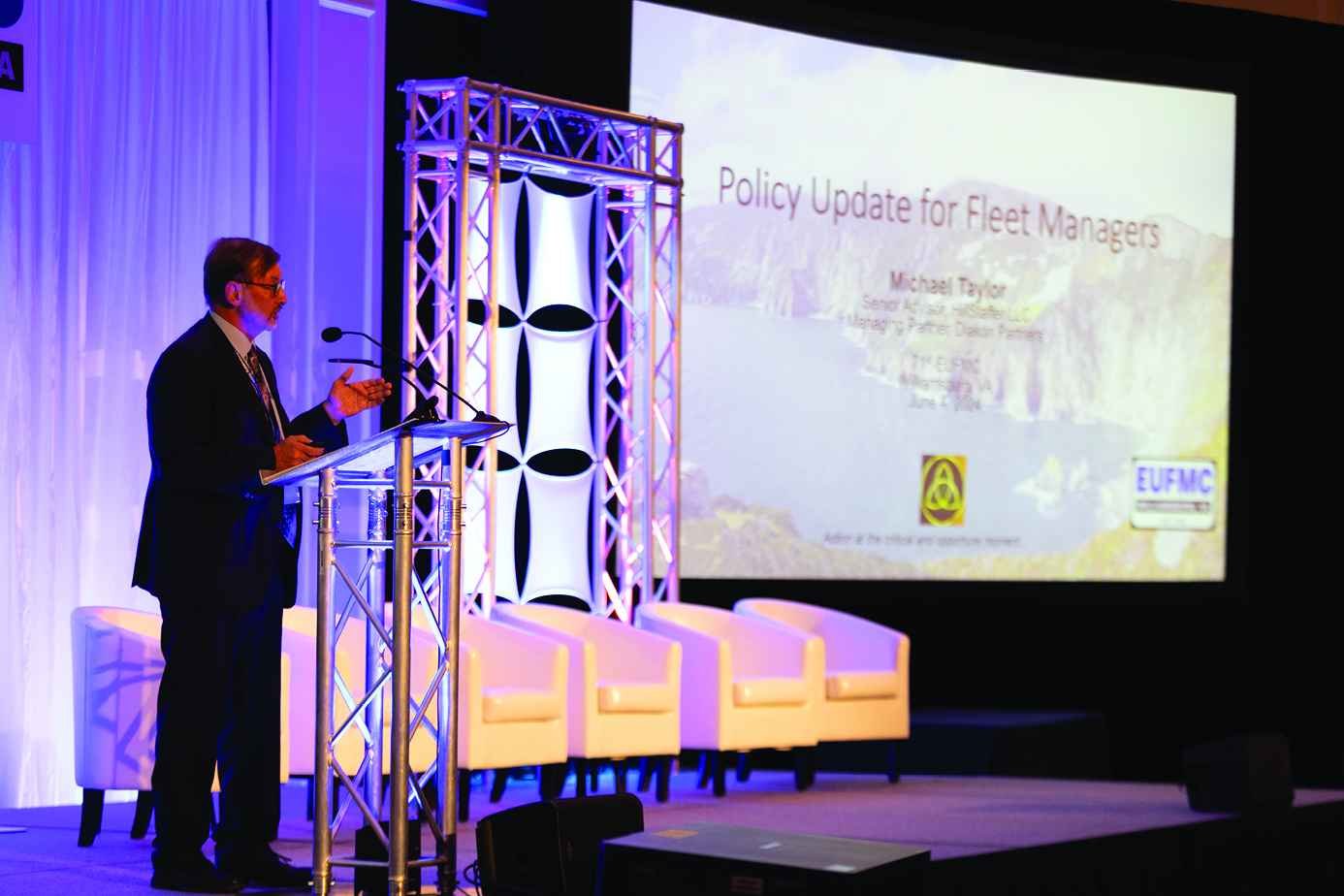
A range of legislation and regulatory activity at both federal and state levels has a continual impact on utility fleet operations.
In a policy update for attendees at EUFMC 2024, Michael Taylor, senior advisor at HillStaffer, a consulting firm for national associations and global organizations, and advocacy lead for NAFA Fleet Management Association, provided a comprehensive update based on more than 30 years of experience within the energy and transportation sectors.
The regulatory and legislative issues that Taylor covered included:
Emissions Regulations
The Environmental Protection Agency (EPA) released a final rule that allows manufacturers more time to meet tailpipe emissions standards. Still recognized as some of the strictest ever proposed by the agency, the standards allow more flexibility in the first three years of implementation than the initial proposal.
EPA projects that the new standards will result in a 50% reduction in national fleet average greenhouse gas (GHG) emissions for light-duty vehicles and a 44% reduction for medium-duty vehicles by 2032.
Automakers will be allowed to meet the fleet emission reduction targets through various technologies, including advanced gasoline vehicles, hybrids, plug-in hybrid electric and battery electric vehicles.
EPA also announced a Phase 3 proposal to revise existing standards to reduce GHG emissions from heavy-duty vehicles in model year 2027 and set new, more stringent standards for model years 2028 through 2032.
Sponsors of a Senate Joint Resolution state that the new standards are overly challenging to implement, would make the cost of new trucks prohibitive for small business owners (potentially increasing pollution by incentivizing operators to keep older, higher-emitting trucks on the road for longer) and would increase supply chain costs. There were 30 members of Congress who sent a letter urging EPA to reconsider their new Phase 3 rule.
Clean Transportation
A $54 million Communities Taking Charge Accelerator funding opportunity is aimed at enhancing electric mobility in communities without access to a home charging infrastructure and transitioning all types of fleets to electric vehicles. The Communities Taking Charge Accelerator is administered by the Joint Office of Energy and Transportation through the U.S. Department of Energy’s Office of Energy Efficiency and Renewable Energy in line with strategies detailed in the U.S. National Blueprint for Transportation Decarbonization.
The new funding builds on the Joint Office’s work supporting the U.S. Department of Transportation’s National Electric Vehicle Infrastructure Formula Program and Charging and Fueling Infrastructure Discretionary Grant Program, which provide funding for states and communities to build a convenient and reliable national charging network.
Funding is available to academic, non-profit, for-profit and government entities for planning, demonstration and/or deployment projects that drive innovation in equitable clean transportation. Key funding objectives include charging and deployment solutions for electrified ultra-light, micro, light and medium-duty fleets that transport people and goods to communities through last mile delivery vehicles.
A managed charging for clean, reliable energy project aims to accelerate solutions in the EV charging ecosystem, including requirements and specifications for end-to-end managed charging functionality to make the most efficient use of infrastructure and minimize impacts on the electrical grid.
Catalytic Converter Theft
The Preventing Auto Recycling Theft (PART) Act legislation works to reduce theft by requiring new vehicles to have a VIN stamped onto the catalytic converter during production, by creating a grant program through which eligible entities can stamp VIN numbers onto the converters of non-stamped vehicles, and by establishing detailed recordkeeping standards for purchasers of used converters.
The legislation also makes it unlawful to sell or purchase catalytic converter parts that have had VIN numbers tampered with or removed and assesses criminal penalties for whoever steals and resells parts in interstate or foreign commerce.
A catalytic converter can be stolen from a vehicle in under a minute, but the problems it can cause mount quickly for fleets in cost, lost time and the inability to find replacement parts. Fleet managers report incurring substantial financial loss due to catalytic converter theft, a crime that has increased 300% year to year.
Vehicle Data Access and Right to Repair
Recent activity includes a relaunched bipartisan Vehicle Data Access Caucus, a new Right to Repair Caucus and a reintroduced Right to Equitable and Professional Auto Industry Repair (REPAIR) Act. Coalitions involved include the American Alliance for Vehicle Owner’s Rights (AAVOR) and the Global Alliance for Vehicle Data Access (GAVDA).
The goal of the Congressional Vehicle Data Access Caucus is to bring all relevant stakeholders together to share their unique perspectives and collaborate to better understand what data is accessible and what effects federal actions may have on the industry. AAVOR goals are to expand membership in the caucus and support a federal solution.
HR 906, the Right to Equitable and Professional Auto Industry Repair (REPAIR) Act. has been marked up by the House Subcommittee on Innovation, Data and Commerce of the House Committee on Energy and Commerce.
Battery Recycling
The U.S. Department of Energy (DOE) announced $62 million for 17 projects funded by the Bipartisan Infrastructure Law to increase participation in and improve the economics of electronics battery recycling. The funding builds on previously announced investments to strengthen the domestic battery supply chain by supporting upstream materials processing, including more than $74 million announced to date to advance EV battery recycling and second-life applications.
The 17 projects selected for DOE’s consumer electronics battery recycling, reprocessing and battery collection funding opportunity are seen as an essential part of the effort to grow and secure America’s battery supply chain.